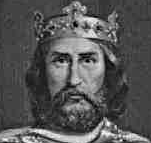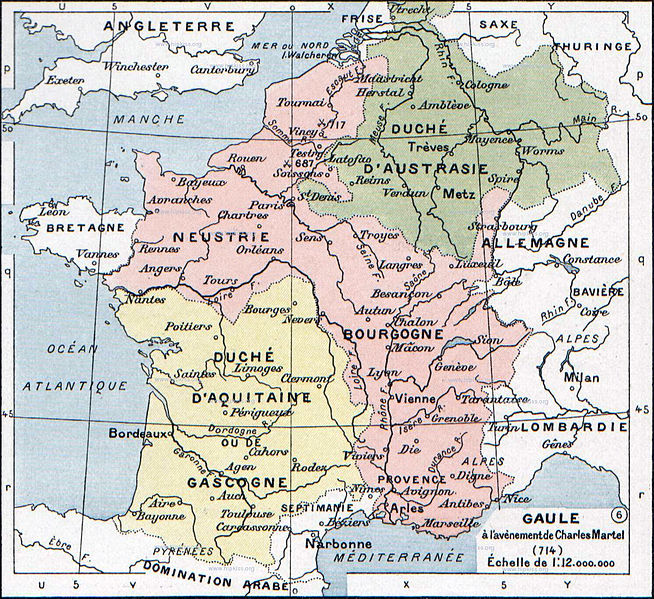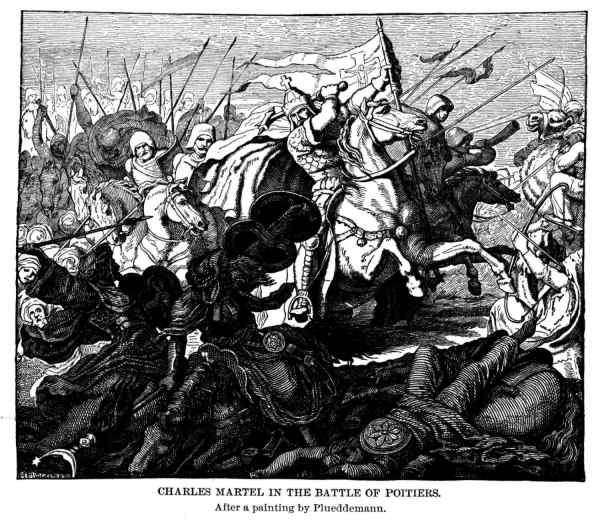The recent permanent removal by the United States of one of the leading voices in the world for radical Islam, and his desire to “restore” the Islamic Caliphate under shari’a law, has brought up similar instances in history when similar aggressive impulses have been smartly put down by western fortitude. Of particular note are the efforts of one Charles Martel, leader of the Franks, who in 732, defeated the aggressive invasion out of Iberia of islamic forces projected by the Umayyad Caliphate of Damascus. Monsieur Martel, literally in French meaning “Hammer”, took his place in history for a definitive victory against islamic warriors that for the nearly one hundred years since the death of Mohammad had known only victory and expansion, and is credited with preserving Europe’s western and Christian genus. Charles Martel is one of the mythic figures of western civilization, presiding at a time of almost no record keeping. It is, therefore fun to put forward conjectures about this very real individual, and return him briefly, so many years later, to a return the spotlight of history.
The Islamic tide of expansionism after the death of Mohammad was rapid and spectacular. Occurring simultaneously under internal strife, the projection across central Asia, Northern Africa, the residual eastern Roman Empire, and western Europe on the Iberian peninsula reached its zenith by the end of the seventh century. The bonding message of universal devotion to the islamic message, and the creative governance of rulers with both political dexterity and organized military talent was the driving force in creating the rapid consumption of over five million square miles of disparate tribes and cultures. Europe, in juxtaposition, was a dysfunctional mess of residual elements of the completely worn out Roman influences, warring tribes, illiterate and disorganized populations, and formidable logistics. Lacking in any shared value system other than the very early influences of the western church, Europe seemed prime ground for further Islamic expansion.
Charles Martel is thought to have been born in 688 AD in the Frankish lands of what is now Herstal, Belgium, in the duchy of Austrasia. He was the illegitimate son of the Duke Pepin of Heristal and his concubine, and therefore had no direct lineage to his eventual role as leader.  Pepin’s death in 714 led to a struggle for ascendancy, and the young Charles found himself in the position initially of prisoner, then ironically, defender of Austrasia, against cousins from the neighboring Duchy of Neustria, seeking to achieve a forced unification of the duchies. Not the first choice because of his illegitimacy, he proved to be the best choice, as this individual showed almost immediately unique battle skills of field interpretation and generalship that far exceeded his fellow combatants.
Pepin’s death in 714 led to a struggle for ascendancy, and the young Charles found himself in the position initially of prisoner, then ironically, defender of Austrasia, against cousins from the neighboring Duchy of Neustria, seeking to achieve a forced unification of the duchies. Not the first choice because of his illegitimacy, he proved to be the best choice, as this individual showed almost immediately unique battle skills of field interpretation and generalship that far exceeded his fellow combatants.  Thrust prematurely into an pitched battle for Cologne, the duchy capitol, Charles, with inferior forces, material, and choice of battleground, sustained what proved to be his one and only defeat on a battlefield. Charles the Warrior, however, was of special stuff. He showed a willingness to learn from his mistakes, identify opponent weaknesses, and develop completely unexpected tactics that soon overwhelmed his enemies. His loss at Cologne proved to be tactical. He retreated to the local mountains; replenished and drilled his forces, and then unexpectedly turned on the returning victorious Neustrian forces at Malmedy, routing them, and proceeding to conquer them. He then whirled and defeated his enemies residually in Austrasia, and soon was the unopposed ruler of both duchies. This illegitimate son of a concubine did what no conqueror typically does – he eschewed his opportunity to be named “king” and instead put forth administrative ‘kings” from his former enemies, while he continued to do what he did best, organize, develop and utilize a progressively invincible army. His understanding of power, and his lack of personal “need” for a title, places Charles in every modern terms in comparison to the traditions of his time. King or not, Charles by 732 was in charge of a vast territory from the germanic Elbe river to the border with the Islamic colony in northern Spain, and with a tactical understanding rarely known in his time, recognized the true threats to his lands were not the squabbles of local tribes, but the powerful new force to the south. He prepared for it with his usual brilliance.
Thrust prematurely into an pitched battle for Cologne, the duchy capitol, Charles, with inferior forces, material, and choice of battleground, sustained what proved to be his one and only defeat on a battlefield. Charles the Warrior, however, was of special stuff. He showed a willingness to learn from his mistakes, identify opponent weaknesses, and develop completely unexpected tactics that soon overwhelmed his enemies. His loss at Cologne proved to be tactical. He retreated to the local mountains; replenished and drilled his forces, and then unexpectedly turned on the returning victorious Neustrian forces at Malmedy, routing them, and proceeding to conquer them. He then whirled and defeated his enemies residually in Austrasia, and soon was the unopposed ruler of both duchies. This illegitimate son of a concubine did what no conqueror typically does – he eschewed his opportunity to be named “king” and instead put forth administrative ‘kings” from his former enemies, while he continued to do what he did best, organize, develop and utilize a progressively invincible army. His understanding of power, and his lack of personal “need” for a title, places Charles in every modern terms in comparison to the traditions of his time. King or not, Charles by 732 was in charge of a vast territory from the germanic Elbe river to the border with the Islamic colony in northern Spain, and with a tactical understanding rarely known in his time, recognized the true threats to his lands were not the squabbles of local tribes, but the powerful new force to the south. He prepared for it with his usual brilliance.
The Islamic generals were used to facing seasonal soldiers lacking discipline and coordination, and assumed no other capacities of the barbarians to the north. A brief foray in 721 with a strike force had not been successful at Toulouse, and they determined on their next efforts to conquer Aquitaine, the southern province of the Franks, to bring all their talents and resources to bear. In 732, at Poitiers near Tours, they meet the forces of Charles the Hammer, and discovered a different kind of opponent. Charles Martel was a brilliant preparer of troops and a spectacular real time field logician, positioning his highly disciplined troops in strategic positions that accentuated his return of the battlefield of the ancient Grecian phalanx, that with modern armour proved impenetrable to the arab light cavalry, and a talent for feigned retreat and flanking maneuver that was unheard of in his time. The Hammer put a crushing defeat on the Islamic forces and pushed them back into Iberia, where they showed no further stomach for Charles’ kind of battle. The battle proved so pivotal, that almost 1300 years after the event, Charles actions are by historians almost universally seen as preventing an Islamic domination over a weakened Europe, setting the stage for feudalism, trade associations, the Renaissance, and the tenets of western civilization this blog reveres today. King or not, Charles Martel proved to be a colossus of the western ideal.
Charles Martel was not done with the battle of Tours. With further consolidation of territories, Charles at the time of his death in 741 stood astride a new Frankish kingdom the expanded the Roman Gaul, and set into place the structure that would become the Holy Roman Empire ruled by his grandson Charlemagne. He instituted the battlefield of the Medieval Age, with permanent armies, fielded with specialists, knights, armour, heavy cavalry, and tactics of siege, discipline, and brutal power. He is remembered today for what did not develop further in Europe, the all consuming fire that was early Islam, permitting the early seeds of a new culture of individual capacity and creativity to eventually take root and supplant Islam as the citadel of intellectual development. Charles Martel cared not a wit for titles, but he understood his place in the world and the power necessary to form and develop his vision. He was one of the first, and very likely, one of the greatest Defenders of the Ramparts of Civilization.

Barack “the hammer” ? Hmm, don’t think he will prove to be a colossus of the western ideal!
Great history. Thx
More like Barack “The Hammer-Head” The scourge of common sense, decency and Western civilization.
Barack Hussein Obama would have been fighting on the side of the Moors and for the expansion of Islam…just as, it can be debated, he is doing currently. If Obama is not a closet Muslim, he is certainly a Muslim sympathizer, and at the expense of Christianity. Where are the heros today like Charles “The Hammer” that will beat back the Islamic threat? We have become wussified by political correctness and the mental disease of liberalism and ripe for conquest by the Islamic hoard that has never relented and is just as eager for expansion in 2012 as they were in 732.